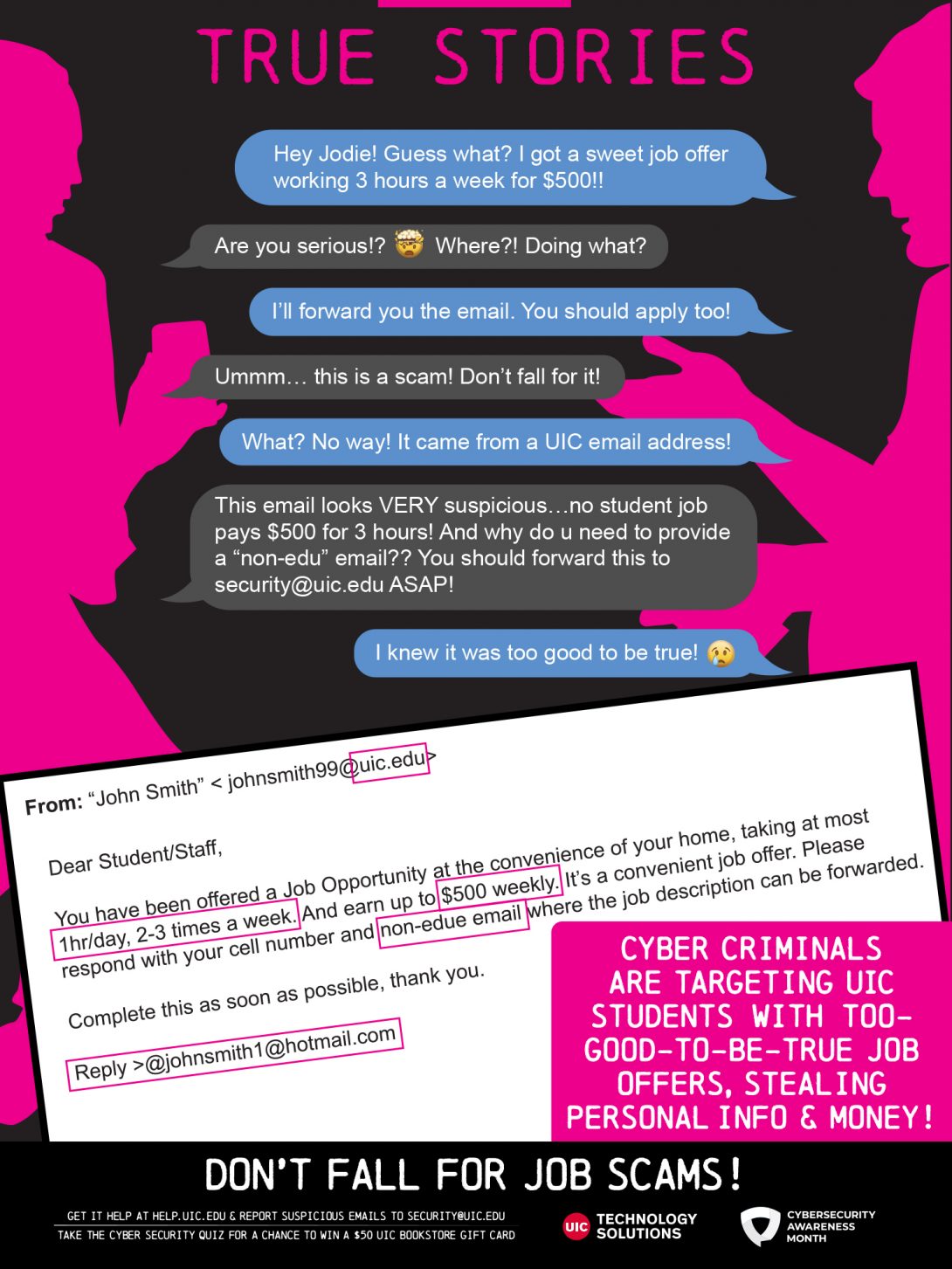True Stories: Don’t Fall for Job Scams + Cybersecurity Quiz
Introduction
While UIC Technology Solutions’ Security Team works hard behind the scenes to stop scammers from reaching the UIC community of students, faculty and staff through various means, some may slip through the cracks. Job scam emails are common, and prey on students looking for part time work. Usually, the offers are simply “too good to be true.” If you are ever in doubt, please forward suspicious email to security@uic.edu.
Quote
Cyber criminals are targeting UIC students with too-good-to-be-true job offers, stealing personal info & money!
True Stories

Students eager for work may be fall victim to this scam. Scammers email students with fake job listings inviting them to apply but their goal is to steal information or money. Here are a few tips on how to spot a scam email and keep your personal information safe:
- Scam emails can come from a @uic.edu email address
Scammers use email spoofing methods to forge a UIC email address and make it appear as if the email is being sent by a UIC employee! Recipients may fall victim to these scams, believing it is coming from a legitimate UIC contact. Though identifying a scammer using a @uic.edu email may be difficult, there are other signs you can look out for. - Big payment for little work
An immediate red flag is when a scammer offers a large payment for very little work. Examples include: “$500 a week for working 1 hour per day, 2-3 times a week.” As the old saying goes: “If it’s too good to be true, it probably is!” - Scammers may send you a check to deposit
One of the main reasons students can fall for this scam is because scammers will send a check you can deposit for your payment, plus an additional amount that the scammer will need you to send to another account as part of the scam. The checks can be deposited but will be flagged later by the bank as fraudulent. By then you will have sent funds to the scammer and may be responsible for funds lost and subsequent bank fees. - Filled with typos and grammatical errors
Most of the time, though not always, scam emails will be written very poorly and contain typos and grammatical errors. In the email example shown, you can see the message is filled with grammatical errors and unnecessary capitalization. - Asks you to reply and provide a non-UIC email
Scammers want you to send them your personal email so they can contact you outside your UIC email. This is because scammers want to avoid getting caught by our vigilant Security team. - Asks you to contact them at a different email address
Scammers will request that you contact them at a different email address rather than the original “From” email address or ask you to call
What to do if you receive a suspicious email
Do not reply or engage
If you receive a suspicious email, do not reply, click on any links, or download any attachments. Forward the potential scam email to security@uic.edu immediately to help our Security team keep the UIC Community safe from cyber criminals!
Stop and think
Does a situation sound too good to be true? Oftentimes, scammers rely on making a person act too quickly, not giving you time to consider their actions. Scammers may pretend to be a relative or colleague in dire need, but think – is it normal for them to send out emails instead of calling? Call that colleague or relative to confirm it’s really them.
Look for red flags
Evaluate the email and check for red flags including typos, offers that are too good to be true, being asked to email an alternate email address.
If you are ever in doubt, please forward suspicious email to security@uic.edu